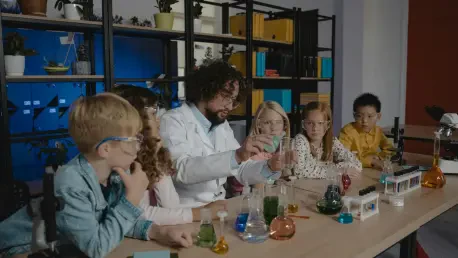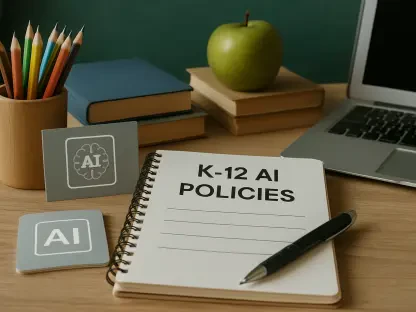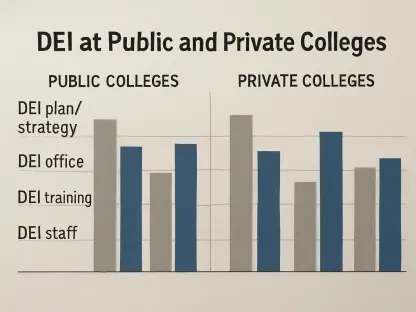In a rapidly evolving world where technology shapes nearly every aspect of daily life, Thomasville City Schools (TCS) in Thomasville, Georgia, are taking bold steps to prepare their youngest learners for the challenges ahead through pioneering STEM (Science, Technology, Engineering, and Mathematics) programs. At Scott, Harper, and Jerger Elementary Schools, students are not just learning abstract concepts but engaging in hands-on, real-world projects that spark curiosity and cultivate critical thinking. From sustainable gardening to coding with robots, these initiatives are tailored to the unique strengths of each campus while aligning with a district-wide mission to build skills for the future. This commitment to early STEM education is setting a remarkable standard, demonstrating how innovative learning can empower students and strengthen community ties in a tech-driven era.
Unique STEM Approaches at Each School
Agriculture and Innovation at Scott Elementary
At Scott Elementary, STEM education takes root in the rich soil of Georgia’s agricultural heritage, offering students a unique lens through which to explore science and technology. Young learners participate in sustainable gardening projects, growing crops like lettuce while applying mathematical calculations and technological tools to optimize farming practices. This hands-on approach not only teaches the fundamentals of plant science but also instills an appreciation for the state’s vital industry. By integrating real-world agricultural challenges into the curriculum, the school ensures that students understand the intersection of innovation and tradition, preparing them to become advocates for sustainable practices in their community.
Beyond the garden beds, Scott Elementary enriches its STEM program through meaningful partnerships with Thomasville High School’s agriculture department. These collaborations provide opportunities for field trips and shared learning experiences, allowing elementary students to see firsthand how their efforts connect to broader educational pathways. Such initiatives expose them to advanced techniques and career possibilities in farming, reinforcing the relevance of their classroom activities. This bridge between grade levels fosters a sense of continuity and purpose, showing students that their early explorations in STEM can lead to impactful futures.
Coding and Confidence at Harper Elementary
Harper Elementary stands as a trailblazer within TCS, leading the charge in computer science education by introducing coding to students as young as second grade. Using platforms like Code.org and hands-on tools such as Dash robots and 3D printers, these young learners develop foundational skills in programming and problem-solving. This early exposure to technology not only demystifies complex concepts but also builds a strong sense of confidence in navigating digital landscapes. By embedding coding into the curriculum, Harper ensures that students are equipped with essential skills for a world increasingly reliant on tech solutions.
In addition to coding, Harper Elementary fosters interdisciplinary learning through projects like student-maintained gardens and participation in Lego League competitions. These activities blend STEM principles with creativity and teamwork, encouraging students to tackle challenges with persistence and innovation. As noted by educators at the school, such experiences cultivate life skills that extend far beyond the classroom, shaping resilient problem-solvers. The combination of technical training and collaborative projects creates a dynamic learning environment where students thrive while preparing for future academic and professional endeavors.
Engineering and Industry Ties at Jerger Elementary
Jerger Elementary distinguishes itself with a robust focus on robotics and engineering, integrating cutting-edge tools like FarmBot—an automated gardening system—into its STEM curriculum. Students engage with advanced technologies to explore engineering design and artificial intelligence, gaining insights into how automation shapes modern industries. This forward-thinking approach not only sparks interest in technical fields but also hones critical thinking as students troubleshoot and innovate with real equipment. Jerger’s program underscores the importance of preparing young minds for a future where engineering solutions drive progress.
A key strength of Jerger’s STEM initiative lies in its deep connections to local industries through the district’s Bulldog +1 initiative, which emphasizes post-graduation readiness. Partnerships with businesses in sectors like aerospace and manufacturing expose students to career pathways and practical applications of their learning. By aligning classroom projects with community needs, the school ensures that students see the tangible impact of their education. These industry ties provide a vital link between academic concepts and professional opportunities, inspiring students to envision themselves as future contributors to the local economy.
Core Themes Uniting TCS STEM Programs
Hands-On Learning for Real-World Impact
Across all three elementary schools in TCS, a commitment to experiential learning forms the backbone of STEM education, ensuring that students engage directly with concepts through tangible projects. Whether it’s planting seeds at Scott, programming robots at Harper, or designing automated systems at Jerger, these activities allow young learners to apply theoretical knowledge to practical challenges. This approach fosters a deeper understanding of STEM disciplines by showing students how their efforts can address real-world issues, from sustainable farming to technological innovation. The emphasis on active participation helps build problem-solving skills that are crucial for academic and personal growth.
Moreover, the focus on real-world impact extends beyond individual projects to instill a sense of purpose in students’ education. By connecting lessons to relevant industries—agriculture in Georgia, coding for tech advancements, and engineering for manufacturing—the district ensures that learning resonates with community realities. This relevance motivates students to take ownership of their education, as they see how their skills can contribute to solving pressing challenges. Such an approach not only enhances engagement but also prepares them for future roles as innovators and leaders in their fields.
Community and Industry Partnerships
A defining feature of TCS’s STEM programs is the strategic collaboration with esteemed institutions like Georgia Tech and Southern Regional Technical College, alongside local businesses such as Cleaver-Brooks and Pursuit Aerospace. These partnerships provide invaluable resources, expertise, and mentorship, enriching the educational experience with cutting-edge insights and tools. By bringing external perspectives into the classroom, the district ensures that students are exposed to the latest advancements and industry standards, bridging the gap between theoretical learning and practical application. This synergy enhances the quality of STEM education while broadening students’ horizons.
Additionally, these collaborations play a crucial role in aligning educational initiatives with community needs and career pathways. Through programs like Bulldog +1, TCS connects students with local industries, offering glimpses into potential professions in fields like technology and manufacturing. Such exposure helps young learners understand the relevance of their studies and envision future opportunities, fostering a sense of direction early on. These partnerships not only support current learning but also lay the groundwork for sustained community development by preparing a skilled workforce tailored to regional demands.
Vision for the Future of Education
Early STEM Exposure for Lifelong Success
The trend of introducing interdisciplinary STEM education at an elementary level, as exemplified by TCS, reflects a growing recognition of the importance of early skill-building for a technology-driven future. By embedding subjects like coding, engineering, and agricultural science into young learners’ curricula, the district ensures that foundational competencies are developed well before middle or high school. This proactive approach allows students to build confidence and curiosity in complex fields, setting them on a path toward academic excellence and adaptability in an ever-changing world. Early exposure also helps demystify STEM, making it accessible and engaging for all learners.
Furthermore, the long-term benefits of this early focus are evident in how it prepares students for emerging challenges and opportunities. TCS’s commitment to integrating real-world applications into STEM learning ensures that skills remain relevant as industries evolve. By fostering critical thinking and innovation from a young age, the district equips students with the tools to navigate future technological advancements and societal needs. This forward-thinking strategy positions TCS as a leader in educational reform, emphasizing lifelong learning as a cornerstone of student success.
Empowering Students and Communities
Educators across TCS share a powerful vision of STEM as a catalyst for personal and communal empowerment, with teachers like Ms. Cone, Mr. Sherrard, and Ms. Sharpe highlighting its role in inspiring curiosity, creativity, and persistence. Their perspectives underscore a belief that STEM education transcends academics, shaping students into resilient individuals ready to tackle complex problems. Superintendent Dr. Scott Sweeting echoes this sentiment, pointing to the transformative potential of these programs in molding future leaders. This collective outlook reflects a dedication to nurturing well-rounded individuals who can contribute meaningfully to society.
Beyond individual growth, TCS’s model offers a blueprint for rural and smaller school districts seeking to deliver innovative education through local resources. By aligning STEM initiatives with state priorities like agriculture and forging strong industry ties, the district demonstrates how tailored programs can address specific community needs while maintaining high educational standards. Looking back, the efforts at Scott, Harper, and Jerger Elementary Schools showcase a remarkable synergy of vision and action, paving the way for broader adoption of such strategies. Moving forward, expanding these partnerships and sharing best practices could inspire similar transformations elsewhere, ensuring that more students benefit from cutting-edge learning experiences.









